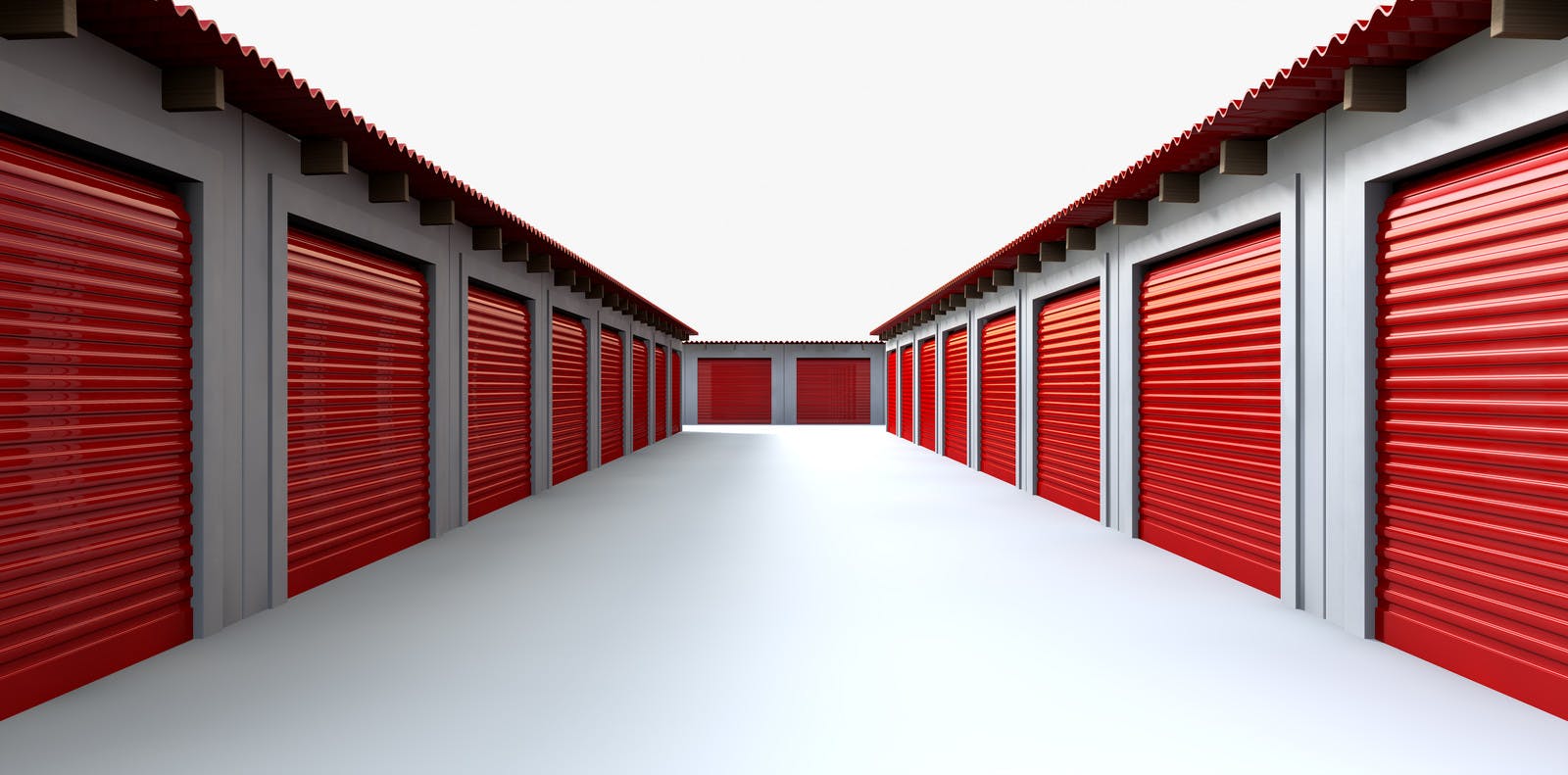Self Storage Investment: The Weathered Rock of the CRE Industry
John Ledger

In the ever-evolving landscape of commercial real estate investments, savvy investors are constantly on the lookout for unique and promising opportunities. While medical office buildings, industrial, and apartment complexes have long been the darlings of the industry, there’s an overlooked underdog in the real estate market that has been quietly gaining momentum: self storage investment.
At their core, self-storage facilities are designed to cater to the storage needs of individuals and businesses alike. They provide secure, climate-controlled spaces for storing everything from household items and seasonal decorations to business inventory and records. As modern life gets more dynamic and urban spaces grow denser, these facilities have become essential for people and companies seeking accessible and convenient storage options.
Like any investment, self-storage facilities come with their unique set of pros and cons. They offer the allure of steady rental income and a relatively low-risk profile, thanks to consistent demand. However, their success heavily depends on location, management, and market conditions. The key to reaping the rewards of self-storage investment lies in understanding these nuances and navigating them effectively.
In this blog, we will delve into the world of storage spaces as a commercial real estate investment, uncovering the reasons behind its newfound appeal, exploring the potential advantages it offers, and shedding light on key considerations for anyone looking to dip their toes into this promising market. So, let’s open the door to this hidden treasure and discover why storage spaces are becoming an increasingly compelling investment opportunity in the commercial real estate arena.
The Self-Storage Asset: What is it and what does the market look like?
Certainly, self-storage spaces come in various types to cater to a wide range of needs. Understanding these types and the overall self-storage market can be crucial for investors looking to make informed decisions. Here’s an overview of different types of self-storage spaces and insights into the self-storage market:
Types of Self-Storage Spaces
Traditional Self-Storage Units: These are the most common type of self-storage units. They come in various sizes, ranging from small lockers to larger units that can accommodate the contents of an entire household. These units are typically located within a facility with various security measures in place.
Climate-Controlled Units: Climate-controlled storage units are designed to maintain stable temperature and humidity levels, protecting sensitive items from extreme weather conditions. These are ideal for storing items like electronics, antiques, artwork, and documents.
Drive-Up Units: Drive-up storage units are easily accessible by vehicles, making them convenient for loading and unloading. They are often used for storing items like furniture, appliances, and seasonal equipment.
Indoor Units: Indoor self-storage units are situated within enclosed buildings, providing additional protection from the elements. These are commonly used for storing household items, business inventory, or personal belongings.
Outdoor Storage: Some self-storage facilities offer outdoor storage options, typically for vehicles such as cars, RVs, boats, and trailers. These open-air spaces are cost-effective for large items but may lack climate control.
Mobile Storage: Mobile storage units, also known as portable storage containers, are delivered to the customer’s location. Customers can load the container at their convenience, and it can be stored on-site or transported to a facility.
Specialized Storage: Some self-storage facilities cater to specific needs, such as wine storage, vehicle storage, or document storage. These specialized options may command higher rental rates due to the unique services offered.
Business Storage: Some facilities offer specialized storage solutions for businesses, including shelving, office space, and amenities like Wi-Fi and conference rooms. This can be appealing to commercial clients seeking convenient storage and workspace.
Understanding the Market
The self-storage commercial real estate market is a dynamic and resilient sector within the broader commercial real estate (CRE) industry. It involves the development, ownership, and operation of self-storage facilities, which provide individuals and businesses with secure and convenient spaces to store their belongings, inventory, and equipment. Here’s a closer look at the key aspects of the self-storage commercial real estate market:
Market Overview:
Rapid Growth: The self-storage market has experienced significant growth over the past few decades, with more and more facilities popping up across the United States and in many other countries. This expansion is driven by the increasing need for storage solutions due to changing demographics, urbanization, and lifestyle trends.
Resilience: Self-storage facilities have demonstrated remarkable resilience, even during economic downturns. When people downsize, relocate, or face life changes, the demand for storage units often increases. This recession-resistant nature has made self-storage an attractive investment choice.
Factors Driving the Self-Storage Market:
Population Growth: As the global population continues to grow, the need for storage space increases. More people are living in urban areas with limited space, which drives demand for self-storage units.
Urbanization: Urbanization trends have led to smaller living spaces, such as apartments and condos, where residents may lack sufficient storage. Urban dwellers often turn to self-storage for their excess belongings.
Life Events: Major life events like moving, marriage, divorce, or the passing of a loved one can prompt individuals and families to seek storage solutions.
E-commerce Expansion: The rise of e-commerce has boosted demand for self-storage facilities, as businesses require space for storing inventory and fulfilling online orders. This has created a niche within the market known as “business storage.”
Market Challenges:
Competition: As the self-storage market continues to grow, competition among facility owners can intensify, potentially affecting rental rates and occupancy levels.
Location Sensitivity: The success of a self-storage investment depends largely on location. Facilities situated in densely populated areas or near major transportation hubs tend to perform better.
The Opportunities within Self Storage
Investing in self-storage units presents a myriad of advantages that make it an appealing option for both novice and seasoned real estate investors. Much like industrial investments, self-storage units are unique in their reliability and secure tenancy. Let’s explore some of the key benefits of self-storage unit investments:
Steady Income Stream: Self-storage units are known for generating a consistent and reliable income stream. One of the reasons behind this reliability is the flexibility of lease agreements, often set on a month-to-month or short-term basis. This allows property owners to adjust rental rates to stay competitive with market conditions, ensuring a stable flow of revenue. Compared to other types of real estate investments, such as residential or commercial properties, self-storage units can offer cost-effective opportunities with lower capital requirements and operating expenses.
Resilience in Economic Downturns: Self-storage investments have shown remarkable resilience during economic downturns. In fact, these facilities often experience increased demand during tough economic times. As individuals and businesses face financial challenges, they may downsize their living spaces or office locations, leading to a surge in demand for storage units. Additionally, self-storage properties typically have longer depreciation schedules than other commercial properties, which can provide investors with extended tax deductions, enhancing the financial stability of their investment.
Reliable Tenancy: Self-storage units tend to boast longer tenant retention compared to tenants in other types of commercial properties. This is partly due to the convenience and flexibility self-storage units offer. With a diverse tenant base that includes individuals, businesses, and organizations, investors can enjoy a stable occupancy rate and consistent rental income.
Scalability: Self-storage investments provide an opportunity for scalability. As investors gain experience and resources, they can expand their portfolio over time. Whether it’s acquiring additional self-storage facilities or increasing the number of units within an existing property, this scalability can lead to portfolio diversification and enhanced returns. Another scalable feature of this asset class is its ability to integrate technology: digital marketing, smart entry systems, real-time pricing adjustments, and other modern technology play a major role in the management of self storage systems.
Residual Value: Self-storage investments often come with valuable underlying land and infrastructure. This can offer a safeguard for investors, as even if the property’s primary use changes in the future, the land and infrastructure can retain value. This can provide exit options for investors, including selling the property for alternative development or repurposing.
The Considerations in Self Storage Investment
While self-storage unit investments offer a range of benefits, they are not without their drawbacks. Investors should carefully consider the following challenges before venturing into this sector:
Competition: One of the primary challenges in the self-storage market is intense competition. As the popularity of self-storage facilities grows, it can lead to pricing pressures, making it harder for investors to maintain high rental rates. Additionally, the oversaturation of self-storage facilities in certain areas can result in fierce competition for tenants. Maintaining consistently high occupancy rates and rental income can become challenging in such markets. Moreover, the self-storage industry can be cyclical in regions with high seasonal populations or transient workers, potentially impacting profitability during off-peak periods.
Costs: While operating costs for self-storage are generally lower than those for many other commercial real estate types, there are significant expenses associated with maintaining and improving these facilities. Costs can include routine maintenance and repairs, security upgrades (such as surveillance cameras and access control systems), and facility improvements to remain competitive and attract tenants. Additionally, developing a self-storage facility from the ground up can require a substantial upfront investment in land acquisition, construction, and property development.
Location: The location of a self-storage facility plays a critical role in its success. Zoning regulations and permitting requirements can vary by jurisdiction, and investors must navigate these regulations to ensure compliance. A poorly chosen location that lacks visibility, accessibility, or proximity to target customers can impact the facility’s performance and profitability. Careful site selection and thorough due diligence are essential to mitigate location-related risks.
Miscellaneous Factors and Key Considerations
Investing in self-storage units can be a lucrative endeavor, but it requires careful consideration and a well-thought-out strategy. Here are some key considerations to keep in mind when venturing into the self-storage investment market:
Market Research: Thorough market research is paramount in self-storage investments. Analyze the local market to understand supply and demand dynamics. Seek areas with population growth, ongoing residential and commercial development, and limited competition as evidenced by storage per capita. Identifying these key factors will help you assess the potential for high occupancy rates and steady rental income.
Property Type: Decide on the type of self-storage investment you want to pursue. You can acquire an existing facility, develop a new one, or invest in portable container storage. Each option comes with advantages and challenges, so choose the one that aligns best with your investment goals and resources.
Facility Size and Unit Mix: Consider the size of the facility and the variety of unit sizes it can offer. A diverse mix of unit sizes accommodates different storage needs and maximizes occupancy. Start with a mix that matches the local market demand to optimize your rental income.
Due Diligence: Before finalizing any investment, perform thorough due diligence to uncover any hidden issues or risks associated with the property. This includes property inspections, environmental assessments, and a review of historical financial performance. To learn more about due diligence, consult our Real Estate Due Diligence Blog.
Legal and Regulatory Considerations: Understand local zoning laws, permitting requirements, and building codes that may impact your investment. Compliance with these regulations is crucial to avoid potential legal issues in the future.
Property Management: Decide whether you will manage the facility yourself or hire a professional management company. Effective property management is essential for maintaining high occupancy rates, tenant satisfaction, and overall profitability.
Marketing and Tenant Acquisition: Develop a comprehensive marketing strategy to attract and retain tenants. This may include online advertising, prominent signage, local outreach, and referral programs to incentivize tenant referrals.
Financial Analysis: Conduct a detailed financial analysis to calculate the return on investment (ROI) and cash flow projections for the property. This analysis should include revenue projections, operating expenses, and potential financing costs.
Financing Options: Explore financing options such as loans, mortgages, and potential investor partnerships. Evaluate interest rates, terms, down payment requirements, and how financing aligns with your investment strategy.
Professional Advice: Consider seeking advice from real estate professionals, financial advisors, and legal experts who specialize in self-storage investments. Their expertise can provide valuable insights and guidance throughout the investment process.
By carefully considering these factors and conducting thorough research and due diligence, you can position yourself for success in the self-storage investment market and maximize the potential returns on your investment.


